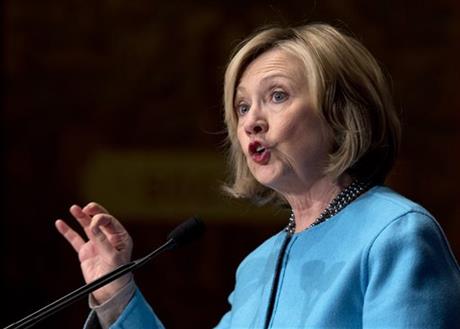The foundation launched by former President Bill Clinton more than a decade ago has battled HIV and AIDS in Africa, educated millions of children and fed the poor and hungry around the globe. It also has the potential to become a political risk for Hillary Rodham Clinton as she moves toward a second presidential campaign.
The former secretary of state has struggled with some recent bad headlines over large donations given to the foundation by foreign governments in the past two years, and the $200 million-plus the organization has raised since 2013, ahead of her anticipated White House campaign.
Republicans contend that foreign governments donating to a foundation led by a potential U.S. president creates unacceptable conflicts of interests. Also, the involvement of big money reinforces a long-standing narrative pushed by the GOP of the Clintons as a couple who frequently mix business and politics.
“Unless Hillary Clinton immediately reinstates the ban on foreign countries giving to her foundation and returns the millions of dollars these governments have already donated, she’s setting an incredibly dangerous precedent,” said the chairman of the Republican National Committee, Reince Priebus. “The American people are not about to elect a president in Hillary Clinton who could expose them to the demands of foreign governments because they dumped massive sums of cash into her foundation.”
The foundation, which is scheduled to hold events in Morocco and Greece this spring, defended its financial support and addressed how it might function if Clinton runs for president. If she seeks office again, something taken as a given by most, the foundation said it would ensure its policies and practices are “appropriate, just as we did when she served as secretary of state.”
In 2009, when Clinton became President Barack Obama’s chief diplomat, the foundation stopped raising money from foreign governments. The fundraising involving non-U.S. entities resumed in 2013, after she left his administration.
The Wall Street Journal last week reported the foundation had received money in 2014 from the United Arab Emirates, Saudi Arabia, Oman and others. The Washington Post reported the charity has raised nearly $2 billion since the former president started it in 2001. About one-third of its donations of $1 million or more come from foreign governments or non-U.S. entities, the newspaper found.
Democrats say the Clintons can defend their work at the foundation because of its track record and history of tackling some of the world’s biggest problems, from AIDS and clean water to hunger, educational opportunities and the protection of endangered wildlife.
“The foundation has done amazing work,” said Connecticut Gov. Dan Malloy, a Democrat who campaigned with Bill Clinton last year. “It has been a unifying force in our national affairs and in our international affairs.”
They also note that the foundation voluntarily discloses its donors — nonprofits are not required to do — and say there is no evidence the Clintons have used it to enrich themselves. Nearly 90 percent of the foundation’s money goes toward its programming.
“If your criticism … is that she raised too much money for her charity to help people around the globe, OK, I’ll take that,” said Virginia Gov. Terry McAuliffe, a longtime Clinton friend and former board member of the foundation.
Yet the influx of corporate and foreign money just before a potential Hillary Clinton campaign has caused some anxiety within her party.
“There was a reason they stopped taking foreign government donations when Hillary was secretary of state,” said Mike Carberry, a Johnson County, Iowa, supervisor and former county Democratic chairman. He said the foundation should reinstate the policies used from 2009 to 2013. “It doesn’t seem right.”
The foundation has strong ties with several corporations and other large foundations. Last September’s annual meeting in New York was sponsored by an array of companies that regularly lobby the federal government, including financial firms HSBC Bank USA, Barclays and Deutsche Bank, as well as Fortune 500 companies such as Coca-Cola, Microsoft, Monsanto, Procter & Gamble and ExxonMobil.
Goldman Sachs, whose corporate officers have played leading roles in the Treasury Department in recent years, has worked with the Clinton Foundation on the 10,000 Women Initiative aimed at helping female entrepreneurs around the globe access capital.
Many of the same donors to the Clintons’ political campaigns have given money to the foundation. Dennis Cheng, a former Hillary Clinton campaign fundraiser, recently left the foundation as its chief development officer and is expected to be a top fundraiser for her expected campaign.
The examination of the foundation’s finances come as many Democrats want Clinton to take on a more populist economic agenda that would demand more oversight of Wall Street firms. It also follows efforts by Democrats to scrutinize Republican Mitt Romney’s business practices in 2012 and tie Republican candidates to millions of dollars provided by the Koch Brothers and their business interests.
Beyond the headlines, many Democrats say it shows the need for Clinton to begin actively campaigning and build an apparatus better suited to rapidly respond to these types of critiques.
“There’s a vacuum,” said Tom Henderson, the chairman of the Polk County, Iowa, Democrats, who noted potential candidates such as former Maryland Gov. Martin O’Malley and former Virginia Sen. Jim Webb are visiting soon. “She isn’t doing anything” in Iowa, he said.




